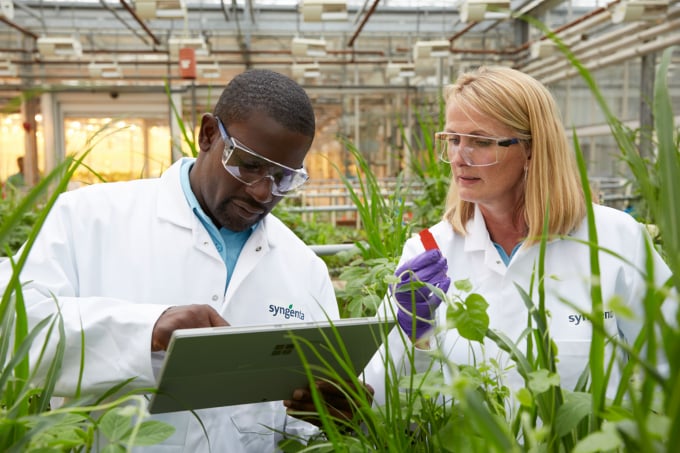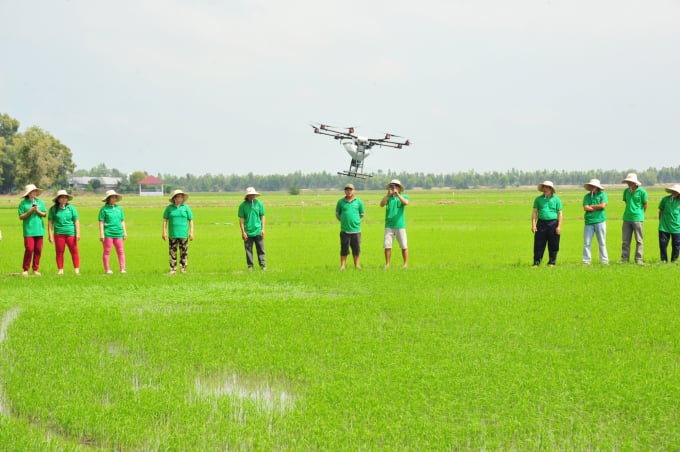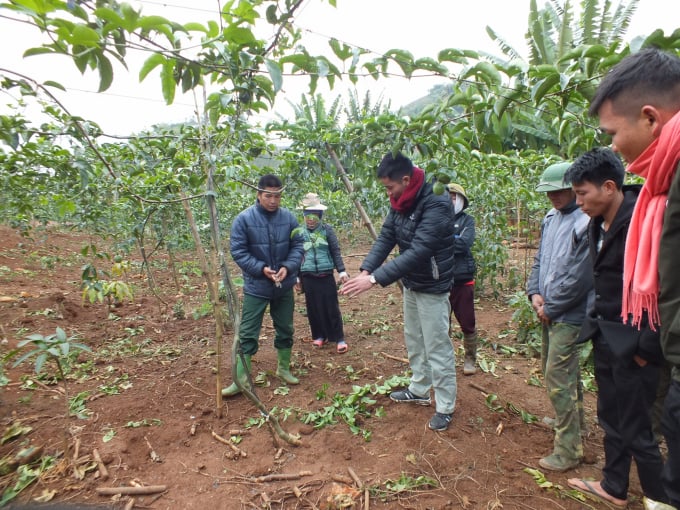May 20, 2025 | 21:23 GMT +7
May 20, 2025 | 21:23 GMT +7
Hotline: 0913.378.918
May 20, 2025 | 21:23 GMT +7
Hotline: 0913.378.918
When it comes to agriculture promotion, I would like to tell you a fairy tale about agriculture fairy which is derived from the story "The farmer and the bear".
In my story, a landowner leases the land to a farmer to plant crops and want to get the tops because it’s a rice farm.
The farmer didn't know what to plant. At that time, the fairy appeared and told him to plant potatoes. The next year, the landowner wanted to get roots. So, the fairy advised the farmer to grow rice. The next year, the landowner asked for both the roots and the tops. The fairy advised him to plant sugar cane. After that, the owner asked for the root, top and stem, the fairy told the farmer to plant corn

Agricultiure promotion need to change to keep up with digital transformation in new development stage. Photo: Syngenta.
During the war, agriculture extension policies guided farmers in production, land reclamation and restoration for poverty reduction and hunger elimination. In market time, agricultural extension guides farmers to increase productivity, qualities of crops and produce commodities.
For more than 30 years of the “Đổi mới” (innovation) period, Vietnam's agriculture has achieved miracles, but as a new team, it is only at the regional level, has not yet reached the continental arena. Entering a new phase, it is necessary to determine strategies and new values to achieve the goal of sustainable development.
The evolution in agriculture not only include long-lasting natural selection but also biotechnology. Now is the time of technology, AI and robots.
Digital technology has 3 phases -data construction, a digital ecosystem and digitalisation in management (administration of the transfer system, not limited to administrative and geographical boundaries).
In the past, farmers did what the fairy told. Now, we have digital technology applications, virtual assistants called Chatbot Callbot. Farmers would be supported to achieve goals of modern agriculture and industrialisation (processing industry, information industry, biological industry, environmental industry, industry serving agriculture.)
We need to build a transfer strategy (EdTech) based on online technology for the agricultural extension science system in the new period. We build two real and virtual ecosystems for farmers in parallel. We have many musicians and knights in agricultural extension but shortly, we will need a full-time conductor for the agricultural extension digital symphony orchestra.
The upcoming goal for farmers is to train professional farmers and train human resources 4.0 who do farming, love farming, master farming technique and get rich by farming.

Drone is used to fertiliser rice. Photo: LHV.
First of all, it is necessary to re-train the agricultural extension staff from central to local levels, to master new agricultural technologies, paving the way for sustainable development for agriculture, rural areas and farmers.
A wise man compared a trainer to a winemaker. From raw materials, building processes, curriculum, fermentation, branding and marketing development, they inspire trainees.
Farmers are those who apply and create technologies. Through agricultural extension forums, the experience and technical creativity of tens of millions of excellent farming households in seven economic regions have been summarised. It’s a good initiative of Vietnam.
Unexpectedly, for many years, we have "worshipped" industry. Now Vietnam's information technology has become the spearhead of the world's success, with 5G infrastructure and smartphones and tablets. I believe that Vietnam's agricultural digital technology will lead agriculture to the forefront, and agricultural economics will develop to a philosophical level.
It can be affirmed that, over the past 30 years, the market has been the cause of liberating our country's farmers from hunger to the average production value of VND 100 million/ha, VND50 million/farming household; an export value of VND45 billion, the poverty rate of 5 – 7 per cent in 2020.
Therefore, a new development step is further to develop markets of science and technology, labour, land, integration of free trade agreements in the market-oriented economic model.
With a multi-sector economy in Vietnam, the agricultural extension also needs to have many different properties, mechanisms and effects. In my opinion, the concept of State agricultural extension should not be used. I prefer the concept of specialized agricultural extension, changing agricultural extension activities from "vertical" to "horizontal" extension, engaging enterprises, farms and co-operatives.
If so, from about 30 projects with the investment of VND200 billion for an agricultural extension at present, we can implement new models with an investment of VND 1 trillion per year. The models of Syngenta, Dabaco, Minh Du, Ba Huan, Vinamilk, TH, Ho Anh Tri, Loc Troi, Guilin, C.P... are typical examples.

Agricultural extension activities should be changed from "vertical" to "horizontal" extension, engaging enterprises, farms and co-operatives. Photo: LB.
From our experience in preventing and controlling natural disasters and pandemics, we summarize with a basic lesson, "4 on-site resources". Therefore, all grassroots agricultural extension agencies should be transferred to the district level for management and administration, following the principles of bottom-up, from market, 4-level budget, public-private partnership mechanism plus national/ regional key program projects.
At the same time, agricultural extension activities also need to overcome the scattering across 63 provinces and cities. The activities need to focus on key ecological regions called key regions such as River Delta Cuu Long, Red River Delta, Central Highlands, associated with developing OCOP products for export, improving the environment, promoting the in-depth application of information technology, deep processing, etc.
Poverty reduction projects should also be combined with 3 National Target Programs including New Rural Construction, Sustainable Poverty Reduction and Socio-economic Development in ethnic minority areas.
Around the world, scientific and agricultural extension activities have criteria for technology transaction speed and technology exchange floors. Therefore, we also need to study, supplement and build technology exchanges together with agricultural product trading floors, forums to connect agricultural product consumption in key regions, determine the speed of technology transactions, bring Vietnamese agricultural products to the level in which science and technology content accounts for 70 per cent, processing content 70-80 per cent, meeting regional and international environmental standards.
Translated by Hien Anh

(VAN) Khanh Hoa is investing over 545 billion VND to develop 240 hectares of high-tech marine aquaculture in order to guarantee a consistent supply of seafood exports and achieve the USD 1 billion target.

(VAN) Minister of Agriculture and Environment Do Duc Duy held a meeting with Soopakij Chearavanont, Chairman of C.P. Group, on May 15.
/2025/05/16/3800-0-nongnghiep-143756.jpg)
(VAN) Suntory PepsiCo Vietnam coordinated with the Ministry of Education and Training to implement an education program on water conservation, reaching nearly 1 million primary school students nationwide.

(VAN) Vietnam’s TH Group officially put its high-tech fresh milk processing plant into operation in the Russian Federation, marking a historic moment as the first TH true MILK cartons were produced in Russia.

(VAN) Use of high-quality broodstock and biotechnology is regarded as the most effective approach to ensuring sustainable and economically viable shrimp aquaculture ahead of climate change and the emergence of increasingly intricate disease patterns.

(VAN) Carbon farming is a form of agricultural practices that helps absorb more greenhouse gases than it emits, through smart management of soil, crops, and livestock.

(VAN) This is a key content of the Memorandum of Understanding recently signed between the Vietnam Fisheries Society and Kunihiro Inc of Japan.